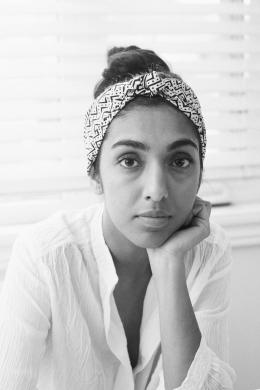Rupi Kaur’s literary ascent is poetry in motion

Photo credit: Baljit
By Jagdeesh Mann (@JagdeeshMann)
The Georgia Straight
Poetry is just the evidence of life – and if your life is burning well, poetry is just the ash.
Leonard Cohen, who said that quote, was for years Canada’s brightest burning star in its poetry-verse. Six months after his passing, a young woman from Toronto is making a legitimate claim for his vacant throne as Canada’s most popular poet. Setting aside Drake and the whole ‘is rap poetry?’ debate, Rupi Kaur’s dizzying rise is putting a new literary twist on the classic rags to riches trope of the immigrant who, as in Kaur’s case, really did ‘start from the bottom’.
Rupi Kaur is the author of Milk and Honey, a collection of poetry that journals love’s four seasons of yearning, union, separation, and renewal. Earlier this year, the book, which was originally self-published, summited the New York Times bestseller list. At only 24 years of age, Kaur has already sold more than a million books of poetry – an item as bankable in this century as waterbeds and asbestos. Her sales figures are matched only by accomplished laureates like Billy Collins, and Maya Angelou.
To make writing her fulltime occupation, Kaur, like Cohen, has embraced the knowledge that understanding ballads and blank verses is as critical as mastering branding. In the 24-hour music channel era of the 80’s and 90’s, it was Leonard Cohen’s MTV and MuchMusic exposure as a singer – or arguably the world’s first white rapper – that underwrote his fame as a poet. Kaur, meanwhile, has leveraged her vast and loyal Instagram following to launch a viable career as a feminist poet.
On this photography portal where women are rewarded for baring their bodies, Kaur has attained over 1.2 million followers by baring her soul but also by exposing the site’s hypocrisy. Over the course of a week in 2015, Kaur confirmed the Facebook owned platform had not outgrown its Silicon Valley ‘bro-culture’ roots when Instagram twice removed the same photo of her curled on a bed with a menstrual spot on her pajamas. The site stated the image was in violation of its community guidelines but later recanted and called their action a ‘mistake’ after media outlets picked up the story and Instagram was widely chastised for censoring a natural female image while, as Kaur pointedly remarked, publishing ‘pornified’ images of thousands of aspiring models.
“I will not apologise for not feeding the ego and pride of misogynist society that will have my body in underwear but not be okay with a small leak,” Kaur said at the time. Since that standoff, her following has surged by over one million users.
It may seem an unlikely fit to showcase poetry on a platform crowded with T&A pics, and food selfies, but in Kaur’s case the medium fits the message perfectly. Many of her posts are free verses poems stacked over a few clipped lines and coupled with an illustration. They are the ideal length to scan within Instagram’s typical ten second viewing window. At times, Kaur’s posts can read less like poems than Confucian quotes: do not bother holding on to that thing that does not want you. But if social media is truly a gathering places for the unhappy as studies are finding, her lines are a balm for her mostly female followers, giving them pause to lift their attention from their screens – for a few seconds anyway – and possibly reflect on the discomfort that brought them to distraction in the first place.
Despite her success, or perhaps because of it, Kaur’s work has its critics who view it as sugar-watered stanzas for quick consumption, like how rap was seen a generation ago. While the 140-character attention span and scroll-holism of Twitter and Instagram have eroded reading culture, these mobile apps have also sharpened the appeal for the pithy and concise use of language that poetry offers. Kaur and other Instapoets are, if nothing else, renewing an interest in the art.
But to get a complete picture of Kaur’s work, readers will need to surf over to a third web portal: YouTube. Her literary journey began as a spoken word performer where poetry is today thriving having returned from print to its oral roots. Standing behind a mic, Kaur is as lithe and spare as a haiku but her animated delivery easily fills an auditorium. Having just returned from a European tour in cities like London and Barcelona, Kaur will be performing to a sold-out Vogue Theatre in Vancouver on June 14th as part of the Vancouver International Bhangra Celebration festival.
It is on stage, Kaur, like fellow Canadian spoken word poet Shane Koyczan, is able to give a voice to the disadvantaged and where she is truly her most poetic. In her work, Broken English, arguably her finest poem, she defends the dignity of immigrant mothers who are mocked for speaking with ‘accents thick like honey’. In the South Asian community where girls traditionally have been denied the same education as boys, the poem resonates deeply with anyone who grew up accompanying their immigrant mothers – this writer included – as they haltingly navigated everyday routines like buying groceries, or taking the bus, all without functional English.
There was poetry in those women achieving their small victories against lengthy odds – the same poetry that is now visible in the contrail of Rupi Kaur’s exceptional story arc.
Jagdeesh Mann is a media professional and journalist based in Vancouver. Twitter: @JagdeeshMann.









